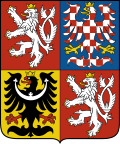
Presidential elections were held in Croatia in January 2000, the third since independence in 1991. They were also the first early presidential elections, as they were held due to the death of incumbent president Franjo Tuđman on 10 December 1999, as well as being the last elections held under the semi-presidential system of government, by which the President was the most powerful official in the government structure and could appoint and dismiss the Prime Minister and their cabinet.

Parliamentary elections were held in Macedonia on 18 October 1998, with a second round on 1 November. VMRO-DPMNE emerged as the largest party, winning 49 of the 120 seats, and later formed a coalition government with Democratic Alternative and the Democratic Party of Albanians.

Presidential elections were held in Bulgaria on 11 November 2001, with a second round on 18 November. The result was a victory for Georgi Parvanov of the Bulgarian Socialist Party, who won 54.0% of the vote in the second round, defeating incumbent president Petar Stoyanov. Voter turnout was 41.8% in the first round and 55.1% in the second. Parvanov took office in 2002, becoming the first former communist to hold the post since 1990.
Presidential elections were held in Moldova on 17 November 1996, with a second round on 1 December. Whilst incumbent President Mircea Snegur received the most votes in the first round, he was defeated in the second by Petru Lucinschi.

Senate elections were held in the Czech Republic on 20 and 21 October 2006, with a second round on 27 and 28 October. The result was a victory for the Civic Democratic Party, which won 41 of the 81 seats. Voter turnout was 41% in the first round and just 21% in the second.
Parliamentary elections were held in Norway on 21 October 1918, with a second round between 4 and 11 November. The result was a victory for the Liberal Party, which won 51 of the 123 seats in the Storting. Despite receiving the most votes, the Labour Party won just 18 seats, a loss of one seat compared with the 1915 elections.

Legislative elections were held in Cisleithania, the northern and western ("Austrian") crown lands of Austria-Hungary, on 14 and 23 May 1907 to elect the members of the 11th Imperial Council. They were the first elections held under universal male suffrage, after an electoral reform abolishing tax paying requirements for voters had been adopted by the Council and was endorsed by Emperor Franz Joseph earlier in the year. However, seat allocations were based on tax revenues from the States.
Presidential elections were held in Bulgaria on 27 October 1996, with a second round on 3 November. The result was a victory for Petar Stoyanov of the United Democratic Forces, who won 59.7% of the vote in the second round. Voter turnout was 63.3% in the first round and 61.8% in the second.

Senate elections were held in the Czech Republic for the first time on 15 and 16 November 1996, with a second round on 22 and 23 November. the first after independence. The result was a victory for the Civic Democratic Party, which won 32 of the 81 seats. Voter turnout was 34.9% in the first round and 30.6% in the second.

Senate elections for a third of chamber were held in the Czech Republic on 13 and 14 November 1998 with a second round on 20 and 21 November.

Senate elections were held in the Czech Republic on 25 and 26 October 2002, with a second round on 1 and 2 November. Voter turnout was just 24.1% in the first round and 31.7% in the second.

Senate elections were held in the Czech Republic on 5 and 6 November 2004, with a second round on 12 and 13 November. The result was a victory for the Civic Democratic Party, which won 37 of the 81 seats. Voter turnout was 28.6% in the first round and just 18.4% in the second.
General elections were held in Italy on 27 January 1861, with a second round on 3 February. The newly elected Parliament first convened in Turin on 4 March 1861, where, thirteen days later, it declared the unification of the country as the Kingdom of Italy.
General elections were held in Italy on 8 November, with a second round of voting on 15 November. They were a snap election, called by Prime Minister Marco Minghetti to strengthen his majority.

General elections were held in Italy on 5 November, with a second round of voting on 12 November.
General elections were held in Italy on 29 October 1882, with a second round of voting on 5 November. The "ministerial" left-wing bloc emerged as the largest in Parliament, winning 289 of the 508 seats.
General elections were held in Italy on 6 November 1904, with a second round of voting on 13 November. The "ministerial" left-wing bloc remained the largest in Parliament, winning 339 of the 508 seats. The papal ban on Catholics voting was relaxed for the first time, and three Catholics were elected.

General elections were held in Liechtenstein on 11 March 1918, with a second round on 18 March. They were the first elections held in the country contested by political parties, as the Christian-Social People's Party and Progressive Citizens' Party had been founded that year. The Progressive Citizens' Party emerged as the largest in the Landtag, winning seven of the 12 elected seats.

Parliamentary elections were held in the Socialist Republic of Macedonia on 11 November 1990, with a second round on 25 November. They were the first competitive elections in the country's history. VMRO-DPMNE emerged as the largest party, winning 38 of the 120 seats.
Events in the year 1999 in Ukraine.








